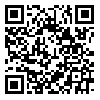Volume 12, Issue 4 (Volume12, Issue 4 2025)
CPJ 2025, 12(4): 24-42 |
Back to browse issues page
Ethics code: IR.UMA.REC.1403.052
Download citation:
BibTeX | RIS | EndNote | Medlars | ProCite | Reference Manager | RefWorks
Send citation to:



BibTeX | RIS | EndNote | Medlars | ProCite | Reference Manager | RefWorks
Send citation to:
Khoshsorour S, Narimani M, Basharpour S. Social Information Processing and Subclinical Autism Spectrum Symptoms in Adolescents: The Moderating Role of Working Memory, Cognitive Flexibility and Mentalizing. CPJ 2025; 12 (4) :24-42
URL: http://jcp.khu.ac.ir/article-1-3848-en.html
URL: http://jcp.khu.ac.ir/article-1-3848-en.html
University of Mohaghegh Ardabili , dr.mhdnarimani@gmail.com
Abstract: (3496 Views)
High autistic traits in adolescents are associated with a wide range of destructive educational and social consequences. Therefore, it is important to identify the influencing factors. The present study was conducted with the aim of investigating the role of social information processing in the autism spectrum symptoms by moderating working memory, cognitive flexibility and mentalizing.
This research was descriptive and correlational type and was done by structural equation modeling method. The statistical population of the research included all 12th grade students of public schools for boys and girls in Tehran in the academic year 2023-2024, 260 of whom were selected using a multi-stage sampling method. The research tools included the Social Information Processing - Attribution and Emotional Response Questionnaire (SIP-AEQ), the Autism-Spectrum Quotient (AQ), the Reflective Functioning Questionnaire (RFQ), computerized version of the Daneman and Carpenter's Working Memory Task, and the Wisconsin Card Sorting Test. Data analysis was done using Smart PLS 3 software.
The results of structural equation modeling showed that Hostile Attribution Bias (t=2/534 ،β=0/322) and Negative Emotional Responses (t=2/001، β=0/275) have a direct, positive and significant effect on the subclinical symptoms of autism. Mentalizing has a moderating effect on the relationship between hostile attributional bias (t=2/549، β=-0/507) and negative emotional responses (t=3/164، β=-0/632) with subclinical symptoms of autism. Also, the moderating role of working memory in the relationship between hostile attributional bias and subclinical symptoms of autism was confirmed (t=4/389، β=-0/394).
According to the results of the research, the use of Mentalization-Based Treatment (MBT), Working Memory Training and Social Information-Processing Skills Training is suggested to the therapists.
This research was descriptive and correlational type and was done by structural equation modeling method. The statistical population of the research included all 12th grade students of public schools for boys and girls in Tehran in the academic year 2023-2024, 260 of whom were selected using a multi-stage sampling method. The research tools included the Social Information Processing - Attribution and Emotional Response Questionnaire (SIP-AEQ), the Autism-Spectrum Quotient (AQ), the Reflective Functioning Questionnaire (RFQ), computerized version of the Daneman and Carpenter's Working Memory Task, and the Wisconsin Card Sorting Test. Data analysis was done using Smart PLS 3 software.
The results of structural equation modeling showed that Hostile Attribution Bias (t=2/534 ،β=0/322) and Negative Emotional Responses (t=2/001، β=0/275) have a direct, positive and significant effect on the subclinical symptoms of autism. Mentalizing has a moderating effect on the relationship between hostile attributional bias (t=2/549، β=-0/507) and negative emotional responses (t=3/164، β=-0/632) with subclinical symptoms of autism. Also, the moderating role of working memory in the relationship between hostile attributional bias and subclinical symptoms of autism was confirmed (t=4/389، β=-0/394).
According to the results of the research, the use of Mentalization-Based Treatment (MBT), Working Memory Training and Social Information-Processing Skills Training is suggested to the therapists.
Keywords: Cognitive Flexibility, Mentalizing, Social Information Processing, Subclinical Autism Spectrum Symptoms, Working Memory
Type of Study: Research |
Subject:
psychology of human behavior
Received: 2024/04/19 | Accepted: 2024/09/21 | Published: 2024/09/21
Received: 2024/04/19 | Accepted: 2024/09/21 | Published: 2024/09/21
Send email to the article author
| Rights and permissions | |
 |
This work is licensed under a Creative Commons Attribution-NonCommercial 4.0 International License. |






